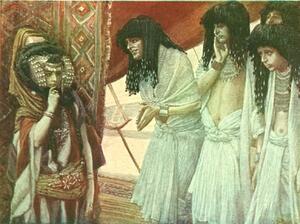Sarai and the Silence Breakers
Once a month, I meet with about ten other Jewish girls as part of the Rosh Chodesh program. We drink tea, bake cookies, do mindful meditations, and kvetch. Most importantly though, we talk about the impact our female identities have on our daily lives and within Judaism. Earlier this month, over a batch of half-baked brownies, we discussed a Torah portion that rattled the foundation of my identity as a Jewish woman.
In Genesis 12:10-12:20, Abram and his wife Sarai go to Egypt to flee a famine. Abram asks Sarai to pretend to be his sister so that the Pharaoh might reward Abram because of her. Abram’s plan works, and when “the woman [Sarai] was taken to Pharaoh's palace,” Abram receives benefits from the Pharaoh. In other words, because Abram let Pharaoh sleep with Sarai (a situation made possible by the fact that Sarai was pretending to be Abram’s sister), Abram reaped benefits.
When I first read the line “through [Sarai] it did go well for Abram,” I wanted to be optimistic. Go Sarai, the first woman to succeed in the workplace! And in the Torah no less! But did she really succeed? As far as I can tell from the text, she never consented to Abram’s plan. Abram exploited his wife’s beauty and sexuality for economic gain. The midrash from The Torah: A Women’s Commentary explains that “the exchange of a woman has taken place.” Regardless of the fact that this text is part of Judaism, the religion I am committed to and hold dear, there’s no way that I, as a Jewish woman, can stand by the idea that it’s okay to treat women as possessions instead of people.
Rabbi Na’ama Dafni-Kellen of the Leo Baeck Education Center in Haifa, Israel says that there are three ways to handle Jewish texts with which you profoundly disagree: One, you can ignore the text; two, you can put it in historical context; three, you can rewrite the passage so it aligns more closely with your point of view.
When I read this text with my Rosh Chodesh group, I found that I couldn’t get myself to ignore it. What did this text mean? What was its message? I needed to know. As a group, we put the text into a historical context. There isn’t anything uniquely sexist about Abram and his understanding of women as property and as economic currency–the Bible is just set in inherently sexist and patriarchal times.
We spent most of our meeting (and hours afterwards) focusing on the last step: rewriting the text to make it more palatable to us as Jewish women. That felt so wrong at first. By rewriting this text, how could we be doing anything but ignoring part of our history? We should grapple with it. We should feel uncomfortable about it. We should think about it again and again and again. We should write midrash! We should write midrash on the midrash.
According to the Torah, these events happened. Whether we like it or not, they are part of our tradition, and rewriting them so that they’re more to our liking doesn’t change that. Just because a story upsets me and makes me uncomfortable doesn’t mean that it should be swept under the rug. I don’t want a new story, I want more of this story. What happened next? Did Abram feel badly at all for what he did to his wife? Did Sarai feel betrayed or taken advantage of? Did this negatively affect Abram and Sarai’s relationship, and if so, did they work to get past it?
I have similar questions about the #MeToo Movement and all the sexual abuse allegations coming to light. Like Sarai, these women’s bodies have been exploited for the benefit of men, without their consent. Because of the many repercussions associated with women sharing their stories (not being believed, losing jobs, the fear of retaliation from abusers, etc…), they often stay hidden. But now, thanks to things like the #MeToo Movement and more widespread support of women coming forward, more of these stories are being told.
What happened next in Abram and Sarai’s story? We may never know. What will happen next in the still developing story about the epidemic of sexual assault and harassment in this country? Well, that’s up to all of us. Sarai’s circumstances and the time in which she lived granted her few rights at all, let alone space to share her story, but we’ve come to a moment in time when it seems that the floodgates have finally opened. We can’t rewrite history, but we can change the narrative around women who speak up about sexual assault by believing them, by supporting them, and by making it clear that what they endured is not, and will never be acceptable.
To help ensure that this historical movement remains grounded in the voices that sparked it, JWA is creating a #MeToo archive on jwa.org. We want to ensure that women’s stories are not erased or forgotten when it comes time to write the history of this watershed moment. Add your experience to this communal narrative today.
This piece was written as part of JWA’s Rising Voices Fellowship.








Beautiful argument. A very educative piece.
Abram is known as a man of faith. My question is, Why did Abram not remember of Jehovah’s promise through the famine? If God made a promise to Abram this would include his household and completion. Let’s not forget that this is about who Jehovah is and his faithfulness. It was Jehovah who sent a plague to Pharoah and his household. Jehovah never left Sarai or kept His promise. We women today have to recognize that Jehovah wants what is best for us and can’t leave Him out of any story. Jehovah is a hero. Teach this to the women, He has our back, and we must meditate in His awesomeness.
My takeaway is that God rescued Sarah. We are the daughters of our Heavenly Father. They overcame their circumstances and later due to Hagar in their lives Abraham lost Ishmael even though he pleated with Our Lord. There are several ways to look at this situation but in my humble opinion we need to submit to the Father In Heaven and let him be our defense even if we do it only based upon his character. After all He is the one True Judge of All. Shalom
My takeaway is that God rescued Sarah. We are the daughters of our Heavenly Father. They overcame their circumstances and later due to Hagar in their lives Abraham lost Ishmael even though he pleated with Our Lord. There are several ways to look at this situation but in my humble opinion we need to submit to the Father In Heaven and let him be our defense even if we do it only based upon his character. After all He is the one True Judge of All. Shalom
Kudos on your efforts to address #MeToo! As far as Sarai’s story goes, the past cannot be changed and the future is unknown. We live in the present. Bluntly put, Abraham pimped out his wife, Sarai aka Sarah. This was acceptable in those times add is still acceptable in certain circles (though less so) today. This behavior is dispicable, disgusting, and dishonorable. Women are the bearers and nurturers of the human race. As such, we should be treated as sacred and with respect. But in order to rece ive such treatment, we must begin by treating ourselves that way, then treating other women, our sisters, that way, and then we should demand the same from others. Finally, we must teach this to our children so that our daughters grow up to be strong and independent women who are treated by our sons with mutual respect and equality.
How can you say Sarai never gave her consent? Read Genesis 12:13
Abram was afraid that he would be killed because back then they were too moral to sleep with another man's wife, so they killed him before they took her. Also, Sarai was his half sister, which I assume you object to also. Yes it is true that women were treated like possessions. Polygamy was tolerated until God declared an end to it through the apostle Paul. The Bible does not condone any of those sins. Much of the Bible is written as history. The Bible tells the truth of what happened. If all scripture is inspired by God then how can God not tell the truth if he IS truth? Ruben sleeping with...Bilal I think it was, I know it was one of Joseph's concubines. Not condoned, did happen. This is like game of thrones meets sister wives. Kind of riveting stories.
Yes, that’s my understanding too of events and Abrams motive … I’m surprised to read that Abrams intent was to exploit Sarai for wealth; I doubt that’s what the text meant at all!
I do like that the blogger was prepared to face the text and not ignore or desire to rewrite it; i don’t know the Torah, but the Holy Bible does not condone the rewriting of any text; this is absolutely forbidden!
I enjoyed reading this, so thank you for your insights; so t has given me food for thought! Blessings!
Omg!!! That's so true Kayla ... Pharoh did slept with sarai, that's why she suggested to take her slave... Just to make them even...uffff
If you read verse 17-20, you see that God was clearly upset by this action. He punished Pharoah and then used that punishment to force Abram back to the Promised Land. And if you recall, Sarai will suggest something similar in the future with Hagar. Sarai is the one who told Abram to sleep with her in order to produce an heir.
Hmmm, reading this I asked myself why will Abram do such a thing, is too expensive, but my question is not about Abram or Sarai but about God's reaction who latter spoke to Abram but not concern about that action he did?
I wonder what was going through Abram's mind the entire time Sarai was in pharaoh's palace. Did pharaoh happen to sleep with sarai?
Read Genesis 20, this article is sickening.
I am studying religions and history. and I learned about the story of Abraham and Sara in Egypt; and while I was researching about the story I came across your note about this. I really like the way you face it, didn't try to ignore it and then try to help other women in the world who may have the same situation.
Abram wasn't trading his wife for riches. How come you came to that conclusion after reading the passage? I'm not justifying his lying but his motive was to save his life and not to gain riches. What he did was wrong but his reason for doing is plainly stated.
Genesis 12
10 Now there was a famine in the land, and Abram went down to Egypt to dwell there, for the famine was severe in the land. 11 And it came to pass, when he was close to entering Egypt, that he said to Sarai his wife, “Indeed I know that you are a woman of beautiful countenance. 12 Therefore it will happen, when the Egyptians see you, that they will say, ‘This is his wife’; and they will kill me, but they will let you live. 13 Please say you are my sister, that it may be well with me for your sake, and that I may live because of you.”
Respectfully, please read further on in Genesis 20:3-6. You will see God prevented Abimelech from sleeping with Sarai.
Shalom!
In reply to Respectfully, please read… by Judy Bolden
True, but does that mean the same happened in the earlier incident?
This is beautiful, Natalie! So moving
In reply to This is beautiful, Natalie! by Emma Mair
There are some biblical texts that are hard to understand how or why they happened, but there are so many instances where Jesus the messiah and Son of God loved women in the gospels. He appeared to women first before he appeared even to his closest friends, the apostles, after his resurrection. Jesus not only fulfills the prophecies of old, but he loves women.